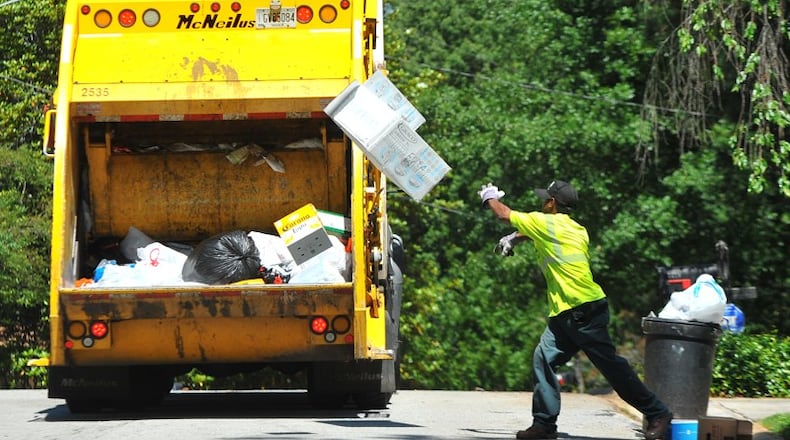DeKalb County residents could face steeper bills for garbage and recycling pickup starting in August if commissioners approve the first rate increase in at least 20 years.
County officials have asked for a 19% residential rate increase, from $265 per year to $315, to cover a persistent shortfall between revenue and the cost of collection.
“The gist of this whole thing really is that we really need to get ourselves out of the red,” Public Works Director Richard Lemke told commissioners Thursday.
The county is seeking swift approval. Commissioners must approve the increase by July 9 if it is to be added to the tax rolls this year, leaving little time for public feedback.
The proposed fee increase comes two weeks after Chief Executive Officer Michael Thurmond asked commissioners to approve a water and sewer rate increase to pay for improvements at the Scott Candler Water Treatment Plant. Those repairs are estimated at $250 million, but Thurmond has not said how much of a rate increase he’ll seek, despite telling commissioners they would have a full plan by this week.
Stormwater fees were increased last year, and water and sewer rates were last raised in 2022. The county increased commercial sanitation fees last year.
Commissioner Ted Terry, who represents the western half of the county, said he is frustrated the proposal was only now coming to commissioners and the public.
“Folks are going to wake up in August to a tax bill and they’re going to say: ‘Oh, my sanitation went up, I have no idea why that happened or where it’s going to,’” Terry said.
Fellow commissioners Mereda Davis Johnson and Robert Patrick said they also wanted the county to make sure residents were adequately informed about the proposal.
Terry said the lack of a rate increase over the last two decades was another example of DeKalb County officials kicking the can on critical infrastructure improvements.
“At some point someone should have said we are spending more than we are taking in,” he said.
Chief Operating Officer Zach Williams said ideally, there should have been incremental rate increases starting at least as early as 2013. But the county met with resistance when it proposed an increase back then.
Instead of increasing fees or reducing services, the county found cost savings by combining recycling and yard waste collection to a single day. They also switched to trucks using compressed natural gas instead of diesel fuel.
The county cut costs in 2015 by dropping from twice-weekly to weekly curbside pickup.
Inflation has significantly increased costs from 20 years ago. Diesel has more than doubled, and the trucks are nearly twice as expensive. The county paid drivers $12 per hour in 2004 and now pay $20 or more. The county has also lost some revenue sources: Recycling used to earn money but now DeKalb has to pay a company to take it.
DeKalb County’s fees are among the lowest in the Atlanta metro and would still be even if the rate increase is approved. At $530 per year, Atlanta’s rates are the highest. The city collects yard waste half as often as DeKalb but offers once-monthly bulk pickup, which the county offers only by request.
DeKalb is proposing increasing fees by $50 for every trash roll cart. Recycling is included in the fees but residents must opt-in, and a second bin will cost $25 extra.
Terry said he’d like to see the county explore ways of increasing revenue that could also reduce what ends up in the landfill, like compost collection. He also pushed the department to explore solar power as another way of generating income.
“If we’re asking for higher rates, there should be a very clear delineation of what kind of services folks are going to be getting for the new rate structure,” Terry said.
The county has struggled to provide consistent service in recent years. Staffing has been particularly challenging since the start of the pandemic, when sanitation crews getting COVID or being exposed at greater rates than other employees.
The Atlanta Journal-Constitution reported how crews were mixing trash and recycling last fall, an error county officials initially said was a one-off fluke. But Thurmond has since acknowledged the county made a “battlefield decision,” to mix garbage and recycling because of staffing issues.
“A policy decision was made,” he said. “First thing you do is get (garbage) off the curb. Recycling dropped in priority.”
After the AJC’s reporting, the county changed its process and went back to separate trash and recycling collection, a change that tripled recycling collection.
About the Author
Keep Reading
The Latest
Featured





